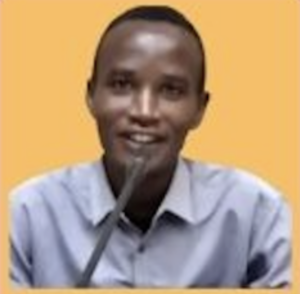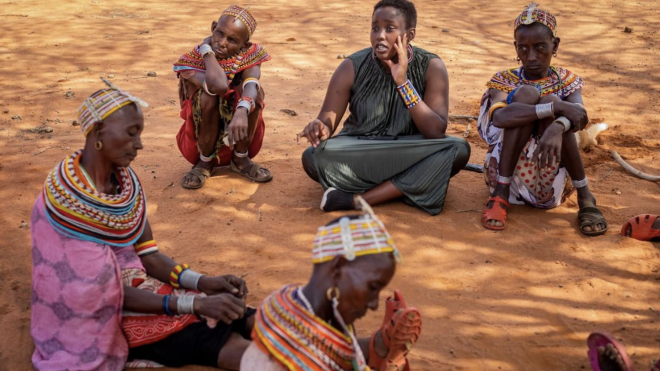In Narok County, the Standard Watch Initiative enhances indigenous pastoralist women’s leadership capabilities to build women’s capacity to achieve equality as decision-makers in pastoralist societies.

The Eyes of Hope on Nature Crime, Surviving the Environment Arena, and Beyond the Death End
By Wycliffe Ledama Mponin
Indigenous pastoralist women undertake training and then form committees that plan, implement, and monitor climate change adaptation actions in their communities. Standard Eco watch currently operates in Narok and its surrounding Ecosystem that are home to indigenous pastoralist communities, including the Maasai, Samburu , and Kalenjin communities. These semi-arid and arid areas of Kenya Communities are particularly vulnerable to climate change-related hazards like droughts and flooding, which threaten livelihoods and create food insecurity, and their rangelands are also threatened by agricultural expansion, mining, and tourism. Empowering women is vital to ensure women’s priorities are addressed: “Although pastoralist men and women are equally exposed to climate shocks and stress, women have fewer opportunities to access and control productive resources or engage in alternative climate resilience livelihoods and incomes.” While men often venture further afield to seek employment in cities, women often remain at home to manage the household. Although this makes women’s knowledge of the environment crucial, “this knowledge, along with the specific plight women face, often goes ignored in drought-mitigation and adaptation strategies,” Ledama notes.
Standard Eco watch supports these pastoralist women by enhancing their leadership skills and participation in local decision-making forums, including a platform for developing and implementing action plans to support community action to mitigate the detrimental effects of climate change. These activities have included establishing grass seed banks to restore degraded land and provide income-generating activities for women and installing rainwater-harvesting technologies to ensure access to water during dry seasons using affordable, sustainable technologies.

This initiative addresses the needs of a vulnerable community whose exposure to climate hazards and susceptibility to climate risks are relatively higher. The various forms of livelihood training provided by the initiative is helping foster long-term economic empowerment of local women and contributing to their climate resilience. In addition, the initiative is also ensuring women’s engagement and participation in decision-making forums which have traditionally been men-only spaces within indigenous pastoralist communities in Kenya, and thereby further helps develop women’s leadership for locally led adaptation.”

Climate change interventions in Transmara west, Kilgoris, and Maasai Mara have resulted in local government authorities, non-governmental organizations, and local communities seeking to raise funds of more than 800,000 USD for key development projects. These funds will help communities enact local by-laws to protect water sources and grazing land, provide emergency food during periods of drought, upgrade water systems, and construct new irrigation systems. These projects are “an impressive example of empowering women and local communities to plan, implement, and monitor improved climate resilience according to the needs of their communities.”

Grass seed banks and tree nursery beds have now also been established in Narok, Kenya, after the Standard Eco initiative participated in knowledge-exchange and learning visits. During the training process women were taught to tap through research into women’s knowledge of their environment is key to successful climate-adaptation at the local level. I am very pleased to see the success of an organization by and for the target community.”

This initiative will allow strengthening interventions that upskill indigenous pastoralist women and enhance their leadership capabilities to ensure more women are involved in community action planning and can contribute to supporting their communities to manage the adverse effects of climate change. Standard Eco watch will utilize the funds to provide leadership training for 200 “women champions” working in climate change adaptation, and women’s groups and forums will be educated about planting trees, grass seed along the range lands and water-harvesting techniques.

The Reflecting on how fortunate I am to have spent my summer leave surrounded by such beautiful nature-deer, birds, and peaceful landscapes-to name a few Protecting this biodiversity and preserving these natural treasures for future generations is what drives our work at standard Eco foundation Much ahead, but we can make a lasting, Before joining UNICEF foresight circle Team , I was an Environment activists , in my own village, and trains out-of-school girls in digital Computer Skills, and Environmental science , thus creating jobs. My volunteer service covers wide Health zones in Narok County, Maasai Mara, Kilgoris and beyond – with a focus on serving the most vulnerable, particularly the indigenous Community. My efforts as CYMG.UNEP, youth advocate, led to significant strides in increasing vaccine coverage. By actively engaging community members and also using standard eco watch, journalist writers international report, my efforts bore fruit in changing attitudes and perceptions towards vaccination. Introducing proxy registrations for birth certificates outside traditional health facilities was also a significant measure for the community. This is part of broader efforts in the region and has effectively increased the number of children registered with local authorities. The increase in registration not only secures the legal identity of children but also ensures their rightful access to essential health services.

Vaccines are safe and effective. They can prevent deadly diseases like polio, measles and some types of cancers. My proactiveness in advocating for vaccination, particularly focusing on integrating indigenous communities into vaccination services included community leaders as part of teams. This approach-built trust and narrowed cultural divides. Notably, in Itong health zone in Maasai Mara game reserve, my efforts led to reintegrating 200 out of 800 Children previously non-compliant with the vaccination schedule. Furthermore, my volunteer efforts extended beyond vaccination to broader health, environment’s health and welfare issues, needless to say anti-FGM campaign. By advocating for the registration of children born outside of health facilities, I significantly enhanced their access to health and nutritional services. This is after I paid a visit to one of my neighbor counties Turkana and Samburu only to find children born outside health facilities are suffering from malnutrition.

Looking ahead, I want to promote inclusion across various key areas, such as ensuring that children, especially the ones from marginalized communities, receive comprehensive care and support they need. And also, to make sure children who are regions affected by hazardous such as floods and drought do not continue missing on vital schooling, as well access to clothes, shelter, food and clean water for drinking. My commitment exemplifies my dedication to not just the immediate health needs of children, but also to the broader well-being and empowerment of vulnerable communities. Having transitioned from my role as a young champion, where I continue to advocate for immunization, Environment climate change, among the indigenous populations.
My role as an Experience Youth advocate, with journalist writer foundation reporter community leader, underscores my initiatives to empower adolescents and youth, with a particular focus on immigrants, Empowering girls and young women, ending harmful cultural practices including FGM + child marriage, and transforming communities in rural Kenya encouraging them to become agents of change and peace.
The beauty of activism is its ability to awaken the world to our planet’s precarious state and ignite the flames of change for the sake of future generations. It’s the hope that keeps me going, knowing that my actions may secure a better tomorrow. Many activists in the global south, particularly Africa, lack the necessary funds to access the internet on a daily basis, which is critical for online activism, but they make it with what little they earn through hustle. Second, despite working tirelessly to ensure that my voice is heard, I frequently receive insufficient funding for my projects. Most of the time, I find myself or put my projects on hold until I save enough money from my job or a donation to proceed, which is insufficient. It would have been easier if our efforts were compensated for.

Among big five wild animals and Beyond Maasai Mara.
Maasai children are responsible for livestock from a young age, while they are proud of the coming-of-age rites, sometimes they just want to have some fun

A young Masai Moran drinking from the same steam with his animals.
In the heart of Maasailand, childhood looks a little different. By the age of seven, many Maasai children are already stepping into roles of responsibility. When not at school, their day often begins with the sounds of hooves and bleats, because it’s their job to care for the family’s livestock.

The younger ones, between seven and ten, usually look after goats and sheep. As they grow older, so do their responsibilities. By the time they are 10 to 15, they’re trusted with small herds of cows. And once they hit 15? That’s it; they’re considered grown-ups. Which means they take charge of large herds, walking long distances in search of grass and water. It’s no small task. Livestock is the heartbeat of the Maasai way of life.
But even the most responsible young herders deserve a day to just be children, before school resumes, and they must juggle double responsibility.

When children see others fly, they start to believe they can too. Education is the great equaliser but only we invest more and much better to make sure the poor and the most marginalized do not get left behind.

When young women believe in themselves, the whole world becomes their runway.

Our commitment to #environmental protection, our work must take into account the disproportionate burden #climatechange imposes on women and girls. To fight climate change, we must fight gender inequality.

Children are the most vulnerable to water crises caused by climate change. We must work together to protect children, families and communities by developing climate smart water plans that strengthen access to safe water, sanitation, and hygiene.


Women and girls spend an estimated 3-4 hours a day collecting water! In rural communities like ours, the nearest water source can be hours away, which means collecting water often takes time away from other important things like attending school, completing homework, and pursuing economic opportunities.
But with well by stardard eco initiative, we ensure that our local girls and women are able to collect water closer to home giving them time and freedom to pursue other important work and opportunities!
 About the Author: Wycliffe Ledama Mponin is a medical doctor, young environmental and public health specialist with extensive experience in environmental impact assessments, risk assessments, and audits. He holds a Public Health Foundation Specialization and an International Diploma in Environment Law and Governance. Wycliffe has worked as a private environmental inspector, gaining valuable expertise in workplace safety and health for sustainable development. As an SDG champion at the Global Institute of Youth and Development and founder of Call for Standard Foundation, he promotes climate justice, environmental conservation, and community livelihoods through science-based solutions and direct community engagement. An accomplished writer and storyteller at Youth4nature.org, Wycliffe has contributed to SDG implementation through research, youth-led climate projects in Kenya, and representing youth voices as a UN Youth Delegate. His work reflects his passion for sustainable development, youth empowerment, and environmental advocacy.
About the Author: Wycliffe Ledama Mponin is a medical doctor, young environmental and public health specialist with extensive experience in environmental impact assessments, risk assessments, and audits. He holds a Public Health Foundation Specialization and an International Diploma in Environment Law and Governance. Wycliffe has worked as a private environmental inspector, gaining valuable expertise in workplace safety and health for sustainable development. As an SDG champion at the Global Institute of Youth and Development and founder of Call for Standard Foundation, he promotes climate justice, environmental conservation, and community livelihoods through science-based solutions and direct community engagement. An accomplished writer and storyteller at Youth4nature.org, Wycliffe has contributed to SDG implementation through research, youth-led climate projects in Kenya, and representing youth voices as a UN Youth Delegate. His work reflects his passion for sustainable development, youth empowerment, and environmental advocacy.
I am text block. Click edit button to change this text. Lorem ipsum dolor sit amet, consectetur adipiscing elit. Ut elit tellus, luctus nec ullamcorper mattis, pulvinar dapibus leo.

